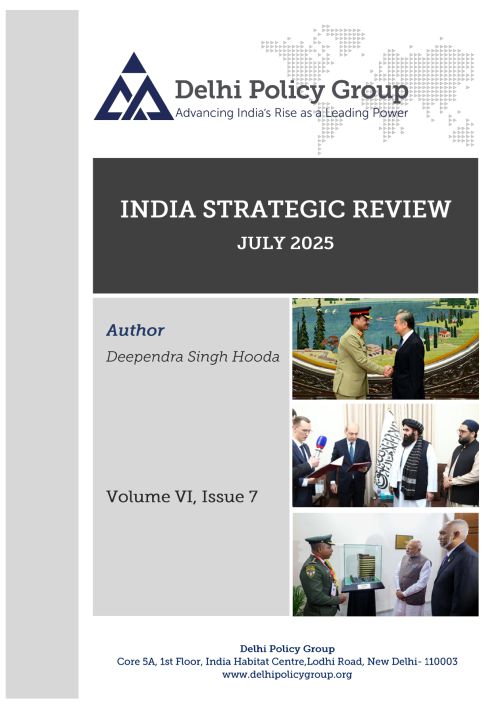India Strategic Review
The ISR features an assessment of key developments, trends, and policies pertaining to India’s immediate and continental neighbourhood and is authored by Lt. Gen. Deependra Singh Hooda (Retd.), Distinguished Fellow for Military Strategy.
The ceasefire between India and Pakistan following Operation Sindoor is holding, but bilateral ties remain frozen. After holding the Indus Water Treaty in abeyance, India is fast-tracking hydropower projects that are under construction in Jammu and Kashmir.
The security situation in Pakistan’s Khyber Pakhtunkhwa and Balochistan provinces continues to deteriorate, with July recording the highest number of fatalities in terror-related incidents in 2025. Increasing attacks in Balochistan have raised concerns over the security of the China-Pakistan Economic Corridor. During Field Marshal Asim Munir’s visit to Beijing, this issue was raised by the Chinese Foreign Minister Wang Yi, urging Pakistan to make all-out efforts to ensure the safety of Chinese personnel.
The Taliban government received a diplomatic boost with Russia granting official recognition of the Islamic Emirate on July 3. The Afghan foreign ministry has called this a “brave decision” and an “example for others.”
The humanitarian crisis in Afghanistan is being aggravated by a surge of returnees from Iran and Pakistan, straining limited resources. Approximately 1.3 million Afghan refugees have been expelled from Iran and Pakistan. Tajikistan has also launched a campaign to arrest and forcibly deport Afghan refugees, while the US has terminated the ‘Temporary Protected Status’ of Afghans living in the country.
Indian External Affairs Minister Dr. S. Jaishankar met with his Chinese counterpart, Wang Yi, on the sidelines of the SCO Foreign Ministers’ Meeting in Tianjin. Dr. Jaishankar stated that the two countries should look at de-escalation of the situation along the LAC and urged Beijing to avoid restrictive trade measures.
On July 18, Chinese Premier Li Qiang officiated over a ceremony marking the groundbreaking of a mega dam on the Yarlung Tsangpo River. The dam has raised concerns in India over manipulation of water flows, ecological degradation and increased flood risks. In response, India has accelerated its own plans for the Upper Siang hydropower project in Arunachal Pradesh.
On July 16, clashes erupted in Gopalganj between supporters of the banned Awami League and the National Citizen Party, leaving five people dead. As Bangladesh moves towards elections next year, political instability could increase unless violence and extremism are controlled.
Sri Lanka is inching toward economic recovery with a recent report projecting a robust GDP growth of 5 per cent in 2024, followed by a 3.5 per cent expansion in 2025. On July 1, the IMF Executive Board completed the 4th review of Sri Lanka's $3 billion Extended Fund Facility program, lauding Colombo's reform performance and authorising an immediate disbursement of $350 million.
Prime Minister Narendra Modi’s state visit to the Maldives on July 25–26 marked a reset in bilateral ties that had been strained after President Mohamed Muizzu came to power and adopted a pro-China stance. The Maldives is now signalling a recalibrated foreign policy that places India as its most reliable partner.
To read this India Strategic Review, Vol. VI, Issue 7, please see the PDF attached



